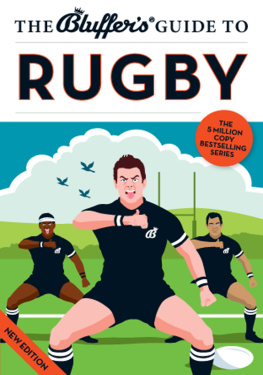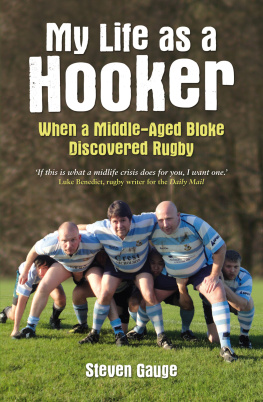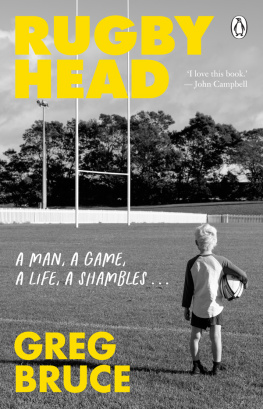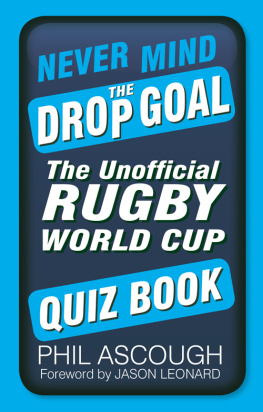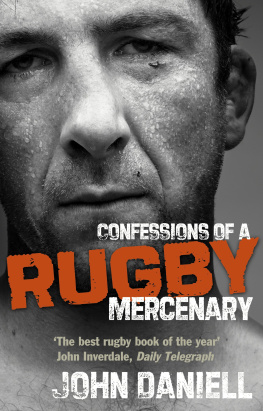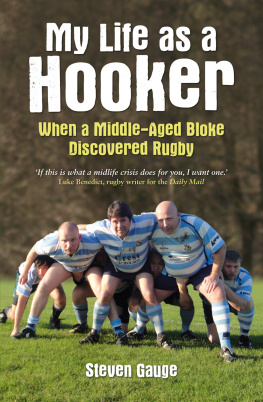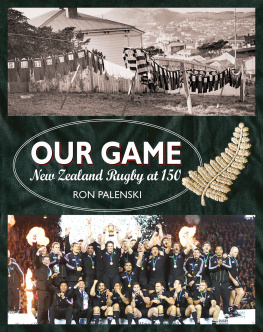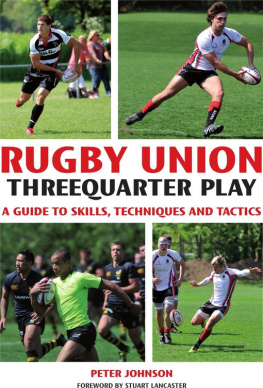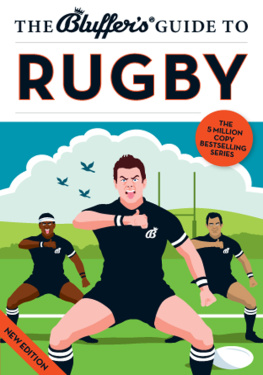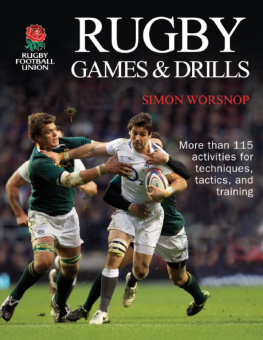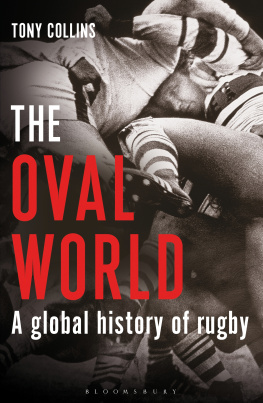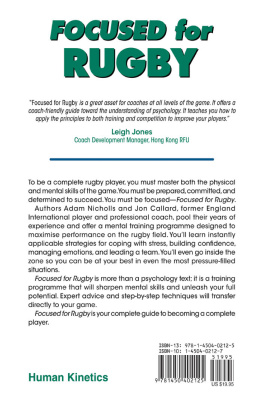

Hammersley House
5-8 Warwick Street
London W1B 5LX
United Kingdom
Email:
Website: bluffers.com
Twitter:
Published 2014
Copyright Bluffers 2014
Publisher: Thomas Drewry
Publishing Director: Brooke McDonald
Series Editor: David Allsop
Design and Illustration: Jim Shannon
All rights reserved. No part of this publication may be reproduced, stored in a retrieval system or transmitted in any form or by any means, electronic, mechanical, photocopying, recording or otherwise, without the prior permission of Bluffers.
A CIP Catalogue record for this book is available from the British Library.
Bluffers Guide, Bluffers and Bluff Your Way are registered trademarks.
| ISBN: | 978-1-909937-08-6 (print)
978-1-909937-09-3 (ePub)
978-1-909937-10-9 |

There is a place on the pitch for everyone, including the socially inept who, as it happens, make absolutely marvellous referees.

KICKING OFF
F or very nearly 200 years, rugby football has been played all around the world, and for most of those years very few people have had the faintest idea what has been going on. Beneath the heaps of bodies piled over the ball, little is seen and even less is known, but much is discussed. Rugby is a game full of bluffers.
So, even if you have never once picked up a ball and ran with it, you will find in this slim volume all that you need to know, or rather all you need to appear to know, in order to enjoy the oval ball game. You will discover how the game was invented on the playing fields of an English public school, or so some people would like you to think. You might find yourself with an overwhelming urge to go and train but, with the help of this guide, you will soon realise that this is far from obligatory. You will even be provided with a selection of instant opinions that will get you through any discussion about the international professional game.
Rugby is a game rife with complex rules, regulations and some extraordinary traditions. Fortunately, very few of them need to be fully understood in order to be enjoyed. With this guide you will soon appreciate the ones that are worth knowing and the ones that are much better ignored.
It turns out that the game of rugby is essentially a warm and welcoming family, albeit one that is mildly dysfunctional and has a massive drink problem. There is a place on the pitch for everyone, including the socially inept who, as it happens, make absolutely marvellous referees. The short, the tall, the broad and the small will all find a role to play in a game that celebrates diversity and ineptitude almost as much as athletic prowess.

The game of rugby is essentially a warm and welcoming family, albeit one that is mildly dysfunctional and has a massive drink problem.

The original home of barroom bluster and banter, rugby clubs are a bluffers paradise. If you can hold your own, hold your nerve and hold your drink, there is a vast amount of joy, entertainment and good company to be had. You might even get a little bit of exercise into the bargain. But the moment will eventually arrive when you find yourself on the spot, which is where this short but definitive guide can offer invaluable help. It sets out to conduct you through the main danger zones encountered in discussions about rugby, and to equip you with a vocabulary and evasive technique that will minimise the risk of being rumbled as a bluffer. It will give you a few easy-to-learn hints and techniques that might even allow you to be accepted as a rugby expert of rare ability and experience even natural sporting talent. But it will do more. It will give you the tools to impress legions of marvelling listeners with your knowledge and insight without anyone discovering that, until you read it, you probably didnt know the difference between a hooker and a haka.

In the northern industrial towns, rugby became almost as popular as whippet racing, pigeon fancying and modelling for Lowry paintings.

THE HISTORY BOYS
T o bluff your way through the early history of rugby, you really only need to remember one name. Its a double-barrelled name, and that of course tells you everything else you need to know.
William Webb Ellis is the name. The double-barrelling tells you that he was a public schoolboy. Fortunately, it wont be hard to remember the name of the school, because conveniently the game itself was named after it. Rugby Football was supposedly invented on the playing fields of Rugby School and, to keep things nice and simple, the school was in a town also called Rugby.
According to a plaque at the school, it was 1823 when William Webb Ellis, with a fine disregard for the rules of football, as played in his time, first took the ball in his arms and ran with it, and thus the game of rugby was born. It might be noted here that this was the first recorded example of cheating at football (but certainly not the last).
FOUNDER OR BOUNDER?
Webb Ellis gets a rugby ball manufacturer named after him as well as the World Cup trophy, so he certainly is a handy chap to know. Whether he truly founded the sport is somewhat up for debate. A sub-committee of Old Rugbieans was formed at some point in the 1890s to consider the evidence. The records they found were conflicting and confused. He certainly existed, went to the school and subsequently became a vicar. He is buried in France and the French rugby authorities went to the trouble of restoring his grave, so the chances are he had something to do with the game. Frankly, you dont need to worry about the details. All you need to do is occasionally drop his name into conversations or match reports.
For example, William Webb Ellis? You played at school with him, didnt you [insert name of oldest member of your club], or was he in the year below you? Note that this isnt a good idea if the member in question sits on the selection committee, or is a close friend of your employer.
Webb Ellis may or may not have invented the game, but his school would appear to have invented spin-doctoring. Having come up with the story, it stuck with it, etched it into a plaque and slapped its name all over the game. A trio of solicitors, who were also old boys from the school, were swiftly convened to draw up the rules, and to this day there is a museum and a lucrative little gift shop attached to the premises.
You should also know that Rugby School was where the fictional Harry Flashman, cad, bounder, coward, liar, cheat and libertine all the things that make an effective rugby player bullied and blustered his way through
Next page
